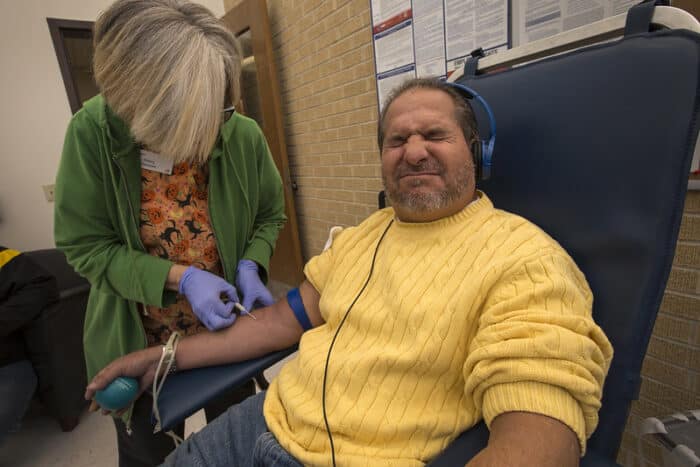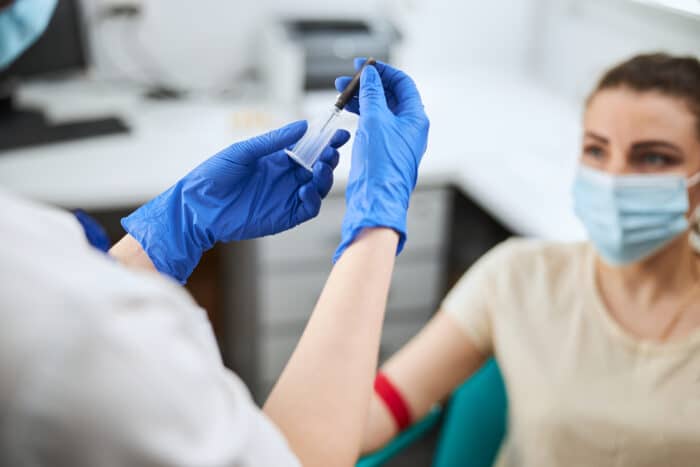If you’re an aspiring phlebotomist, you might be wondering what certifications are legitimate, and which you should aim for.
Although certification is only sometimes mandatory for phlebotomists, it is highly recommended due to several reasons.
In this article, we will uncover more about NHA certification, the exam structure, eligibility, and much more.
So, let’s get started!
What is the NHA Phlebotomy Certification?
The NHA Phlebotomy Certification is a specialized certification program provided by the National Healthcareer Association (NHA) designed for individuals aspiring to attain official recognition as phlebotomists.
Also read: What is a Phlebotomist
There are some key points related to the NHA phlebotomy certification, such as:
Training and Education:
To become a certified phlebotomist with the National Healthcareer Association (NHA), you start by getting trained in phlebotomy. This training covers important topics like how the human body works, how to safely collect blood, how to keep patients safe, and how to communicate with them. It’s a bit like going to school to learn how to draw blood safely.
Certification Exam:
Once you finish your training, you take a special test called a certification exam. Think of it like a big test that checks if you’ve learned everything you need to know about phlebotomy. Passing this exam is a crucial step to becoming a certified phlebotomist.
Proof of Competence:
When you pass the NHA Phlebotomy Certification exam, you receive a certificate. This certificate shows that you’re qualified to draw blood safely and accurately from patients. It’s like a certificate of achievement that proves you can do the job well.
Career Opportunities:
Having an NHA Phlebotomy Certification can help you find jobs in places like hospitals, clinics, and labs. Employers like hiring certified phlebotomists because it means they are well-trained and can take good care of patients.
Continuing Education:
To keep your certification, you often need to keep learning and maybe take more tests from time to time. This ensures you stay updated on the latest ways to do your job safely and well.
NHA Phlebotomy Exam Structure
The NHA Phlebotomy Exam is structured to assess a candidate’s knowledge and skills in phlebotomy.
Here is an outline of the typical structure of the exam:
1. Multiple-choice questions: The exam usually consists of multiple-choice questions that test your understanding of phlebotomy principles, techniques, and best practices. These questions assess your theoretical knowledge in the field.
2. Practical Skills Assessment: In addition to the written portion, the NHA Phlebotomy Exam often includes a practical skills assessment. During this part of the exam, you may be required to demonstrate your ability to perform essential phlebotomy procedures, such as venipuncture (drawing blood from a vein) and capillary puncture (fingerstick).
3. Anatomy and Physiology: Expect questions related to human anatomy and physiology, particularly those aspects that are relevant to phlebotomy. You may need to identify veins and understand how the circulatory system works.
4. Safety Protocols: The exam assesses your knowledge of safety protocols and infection control measures to ensure that you can perform phlebotomy procedures safely for both yourself and your patients.
5. Ethical and Professional Standards: Questions related to ethical conduct and professionalism in healthcare may be included to evaluate your understanding of patient rights and confidentiality.
6. Specimen Handling: You may be tested on your knowledge of proper specimen handling and labeling, ensuring that collected samples are accurately processed and tracked.
7. Equipment and Supplies: Questions about phlebotomy equipment and supplies, such as needles, tubes, and tourniquets, may be included to assess your familiarity with the tools of the trade.
Also see: Phlebotomist Skills
NHA Phlebotomy Exam Eligibility
Eligibility for the NHA Phlebotomy Exam depends on certain criteria you must meet to qualify. Generally, you need to complete a phlebotomy training program from an accredited school, which includes both classroom learning and hands-on practice.
You’ll also need a high school diploma or its equivalent, like a GED. Some programs may require a minimum number of training hours or procedures performed during your training to make sure you have enough practical experience.
In addition to your education, you might need to undergo a criminal background check for patient safety, pay the exam fees, and submit your application along with all the required documents.
It is important to note that eligibility requirements can change, so it’s important to check the most up-to-date criteria on the official NHA website or contact the NHA directly to make sure you meet all the necessary requirements before you plan to take the exam.
How Many Questions Are on the NHA Phlebotomy Exam?
The number of questions on the NHA (National Healthcareer Association) Phlebotomy Exam can vary, and it might change over time. Typically, the exam consists of around 100 to 120 multiple-choice questions. These questions cover a range of topics related to phlebotomy procedures, safety protocols, anatomy, specimen handling, and more.
How Many Questions Can You Miss on the NHA Phlebotomy Exam?
The number of questions you can get wrong on the NHA Phlebotomy Exam isn’t a fixed number. Instead, it depends on how tough the exam is on the day you take it. They use something called “scaled scoring.” It means the passing score can change from one exam to another.
To pass, you need to get a score that’s good enough based on the exam’s difficulty level. What counts as a passing score can be different each time. To find out what’s needed to pass the NHA Phlebotomy Exam, it’s best to check the NHA’s official website or get in touch with them directly. They can give you the latest information about passing scores and how they calculate them.
Read: Phlebotomist Salary

Do You Want To Become a Phlebotomist? Check Out Free Phlebotomist Masterclass!
In our masterclass you learn:
- How to be a Phlebotomist faster…in just 2 months!
- Avoid student debt & driving to classes
- #1 thing employers want from Phlebotomists
- How to stand-apart & get a university certificate for a strong resume
NHA Phlebotomy Exam Study Guide
The NHA Phlebotomy Exam might seem intimidating, however, we are here to guide you through the process and tell you it is not.
Here is a brief study guide for the NHA Phlebotomy Exam-
Certainly, here’s an explanation of the steps involved in preparing for the NHA Phlebotomy Exam using a study guide:
Enroll in an Online Phlebotomy Program:
To become eligible for the NHA Phlebotomy Exam, you’ll typically need to complete a phlebotomy training program. Many educational institutions offer online phlebotomy programs that cover essential theory and hands-on skills. These programs provide the foundational knowledge you’ll need to succeed on the exam.
Complete your Clinical Experience With An Externship:
Hands-on experience is crucial in phlebotomy. As part of your training program, you will likely have the opportunity to complete a clinical externship or internship. This hands-on experience allows you to practice venipuncture and other phlebotomy techniques under the supervision of experienced professionals.
Apply for the NHA Phlebotomy Exam:
Once you’ve completed your phlebotomy training program and clinical experience, you can apply for the NHA Phlebotomy Exam. The application process typically involves submitting required documentation, such as your training program certificate and exam fees. Be sure to review the eligibility criteria and application deadlines set by the NHA.
Practice for The Exam:
To prepare for the NHA Phlebotomy Exam, it’s highly recommended to use a study guide or exam prep materials. These resources often include practice questions and sample tests that simulate the exam’s format and content. Consistent practice can help you become familiar with the types of questions you’ll encounter and boost your confidence.
Sit for the Exam:
On the scheduled exam day, you will need to arrive at the testing center on time and present the required identification. The exam typically consists of multiple-choice questions and may include a practical skills assessment. Your results will be provided after the exam.
If you do not pass the NHA Phlebotomy Exam on your first attempt, don’t worry. The NHA typically allows candidates to retake the exam, but there may be a waiting period before you can do so. The waiting period and the number of re-attempts allowed can vary, so it’s important to check the NHA’s policies for the most current information.
To reapply for the exam, you will need to submit a new application and pay the exam fees again. It’s essential to use the time between attempts to further review and strengthen your knowledge and skills to increase your chances of success.
See: How to Become a Phlebotomist
Conclusion
To conclude, certification not only opens doors to various career opportunities but also ensures that phlebotomists are well-trained and skilled in their vital role in healthcare. Remember, the NHA Phlebotomy Exam is your ticket to becoming a certified professional in this field.
Related Resources:
- Ultimate Phlebotomist Resume Guide – Phlebotomy Job
- How To Choose Phlebotomist Classes Online?
- Which Two Skills are Important for a Phlebotomist?
- Phlebotomist Degree
- Phlebotomy Externship
- What Jobs Can I Get With a Phlebotomy Certificate?
- Top Places That Hire Phlebotomy Techs
- Phlebotomist vs CNA
- Therapeutic Phlebotomy
- Certified Phlebotomy Technician
- Phlebotomy Classes
- EKG Phlebotomy Technician
- Order of Draw Phlebotomy
- Phlebotomy Internship
- 4-Week Phlebotomy Classes Online
Related Articles
-
How to Be Successful in College in 2022 – 7 Simple Tips to Succeed
-
How Do Scholarships Work? Read This First…Truth is Shocking
-
7 Best College Majors 2024: What Should I Major In?
-
How to Choose a College – 10 Things You Must Consider in 2024
-
Why Go to College? Top 13 Benefits for Adult Students in 2022
-
Top 5 Best Alternatives to Community College for 2024









